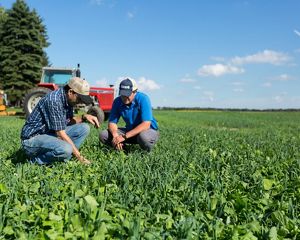The Nature Conservancy, Star of the West Milling Expand Sustainable Wheat Program to 3,000 Acres
Enrollment is now open to wheat growers for the third year of pilot program.
Media Contacts
-
Ryan Hermes
TNC
Phone: 517-999-7745
Email: ryan.hermes@tnc.org
The Nature Conservancy in Michigan (TNC) and Star of the West Milling Co. today announced enrollment is now open for wheat growers to join their sustainable wheat pilot program called Sustainable Option Wheat, or SOW. The program is expanding to 3,200 acres for its third and final year. TNC is also expanding the options for nutrient management programs to encourage more farmers to enroll.
So far, more than 2,800 acres have been enrolled in the program which has produced 238,612 bushels of sustainably grown wheat over the past two years.
“The response to this program has been overwhelmingly positive since day one and we are thrilled to have worked with 11 great Saginaw Valley wheat farms so far and we look forward to working with even more this year,” said Ben Wickerham, agriculture program director for TNC in Michigan. “This program guides wheat growers down a path to improve soil health and protect water quality by encouraging them to implement tried-and-true healthy soil practices, which benefits their fields and the Saginaw Bay watershed.”
“We take sustainability seriously at Star of the West Milling and we are pleased with the response we have seen to this program,” said Lisa Woodke, sustainability director for Star of the West Milling Co. “I want to thank each and every grower that has already signed up for this program, or will soon, because the practices you’re implementing now will be felt by future generations of farmers.”
TNC and Star of the West first partnered on the program in 2021. The two work together on farmer enrollments, farm evaluations and verification of in-field practices. Once the recommended sustainability criteria are implemented and verified, participating growers are eligible to receive nature-based bonuses at Star of the West when they sell their wheat.
On-farm sustainability practices include Integrated Pest Management, cover crops, nutrient management, and reduced tillage. These practices play a major role in increasing soil health, reducing offsite impacts, and helping fields become more resilient to extreme weather events, like flooding and droughts.
While the program is slated to end next year, TNC is working with the University of Michigan to conduct a feasibility study on the program’s long-term viability.
“I strongly believe this sustainable wheat program could be a model for other first purchasers to set criteria—and a market—for sustainably raised wheat and other small grains,” Wickerham said. “Now more than ever, people are genuinely interested in where their food comes from and how it was produced. Our hope is that end users will see the value in this program, and we believe this feasibility study will reinforce that.”
Signup for the 2024 program is open now and will be filled on a first-come, first-served basis. Both red and white varieties are accepted, though white is preferred. Sustainable Option Wheat is available to wheat growers across Saginaw Valley at all Star of the West receiving locations. Contact TNC’s SOW program coordinator Joel Leland at joel.leland@tnc.org for more information or get enrolled.
The Nature Conservancy is a global conservation organization dedicated to conserving the lands and waters on which all life depends. Guided by science, we create innovative, on-the-ground solutions to our world’s toughest challenges so that nature and people can thrive together. We are tackling climate change, conserving lands, waters and oceans at an unprecedented scale, providing food and water sustainably and helping make cities more resilient. The Nature Conservancy is working to make a lasting difference around the world in 81 countries and territories (40 by direct conservation impact and 41 through partners) through a collaborative approach that engages local communities, governments, the private sector, and other partners. To learn more, visit nature.org or follow @nature_press on X.



